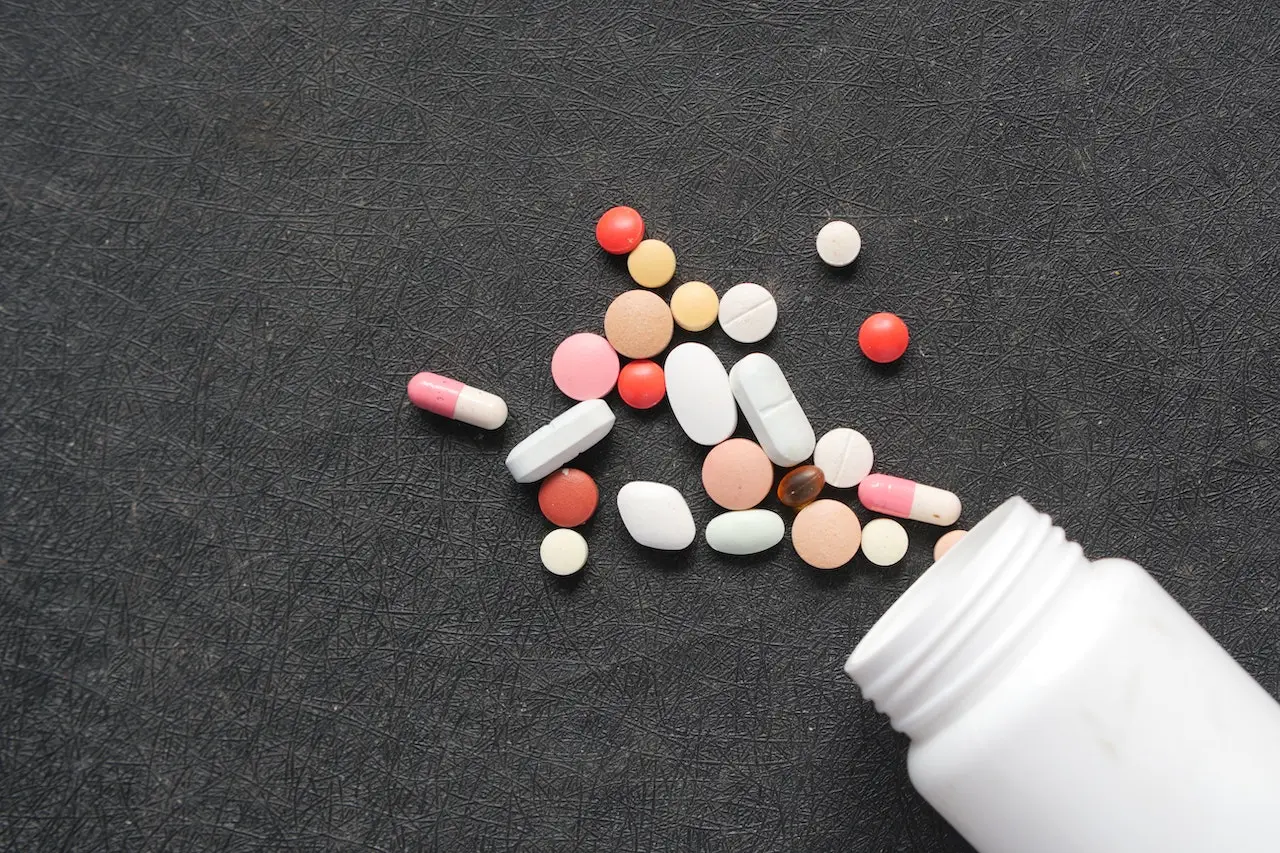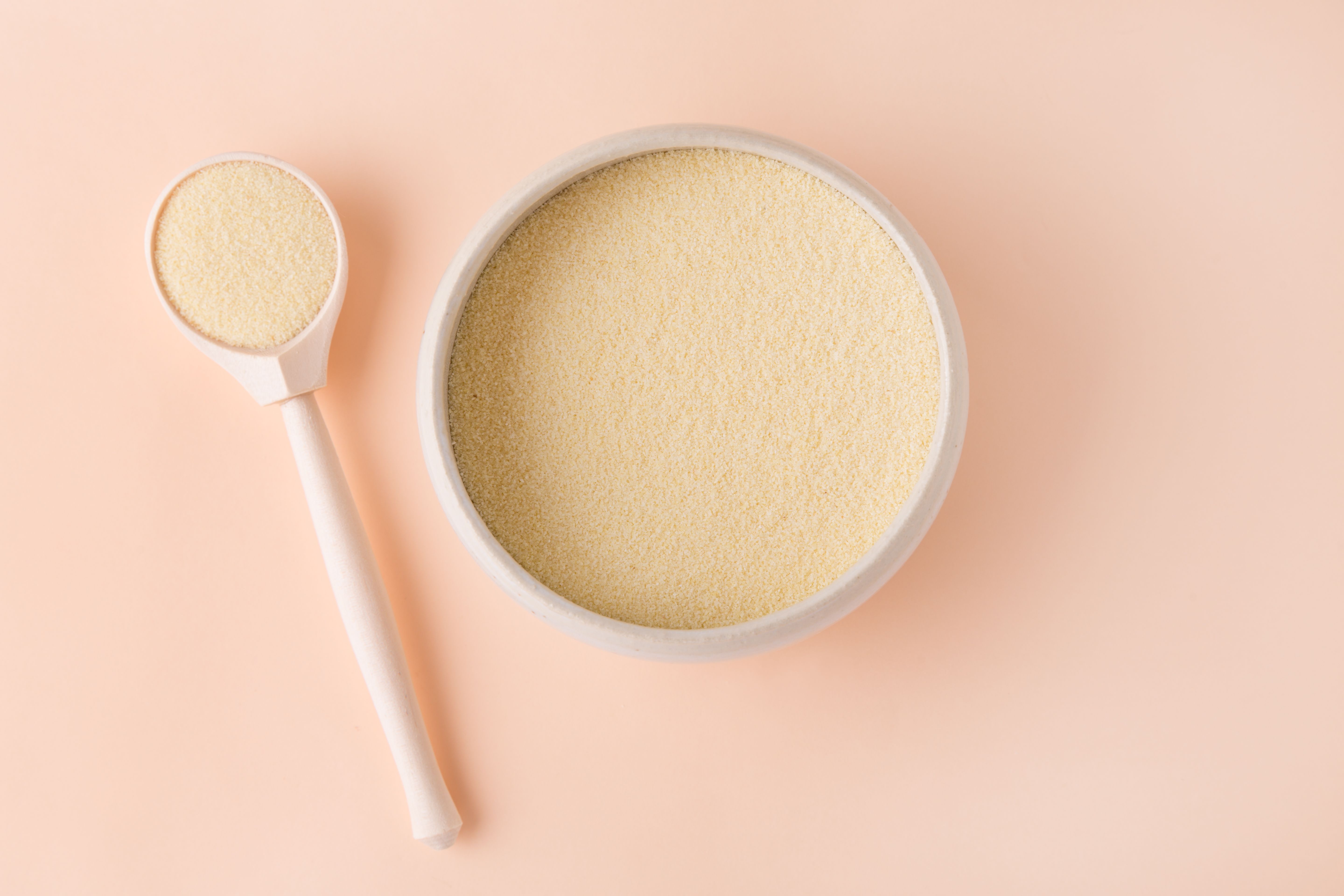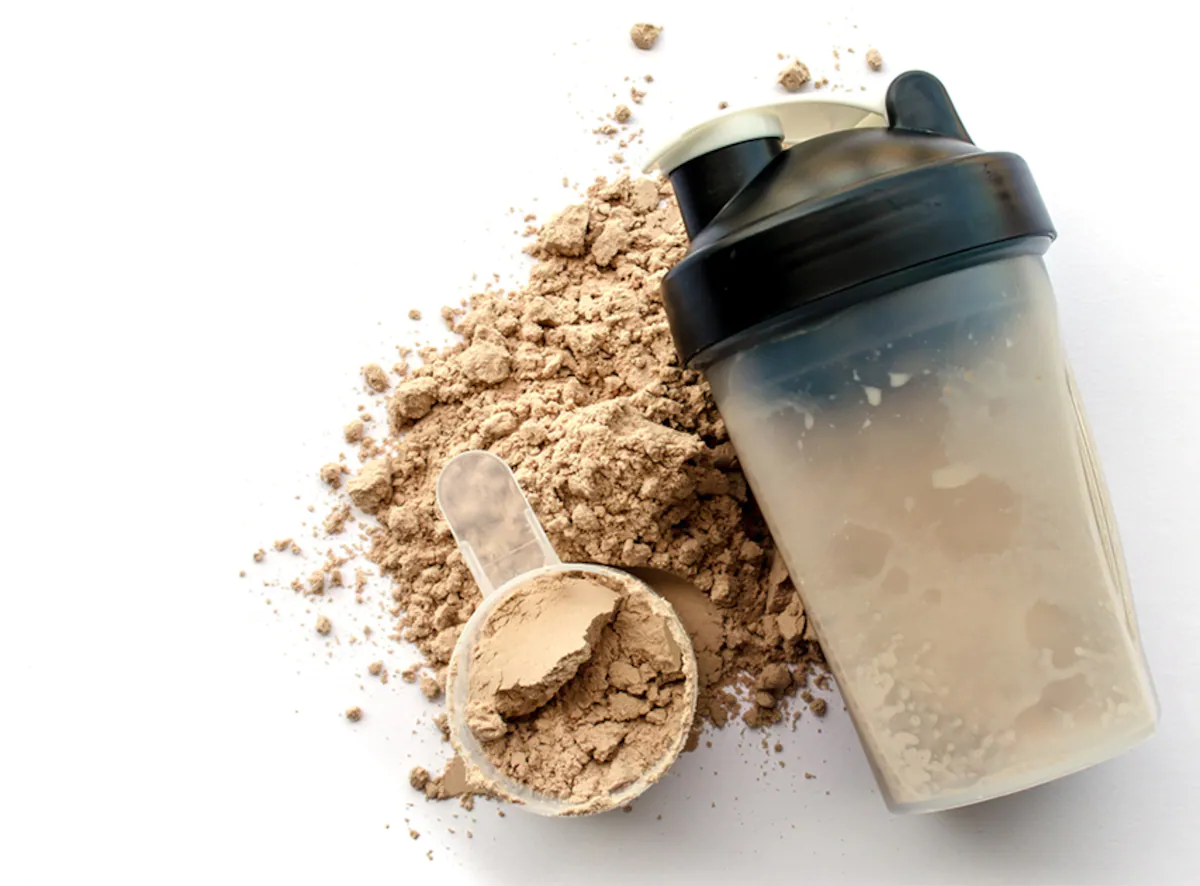What is Glutamine?
Glutamine is referred to as a building block for making proteins, amino acids, and glucose in our bodies. Glutamine is naturally produced and stored within our bodies, found in our skeletal muscle, lungs, adipose tissue, and liver muscles. Additionally, glutamine is transferred by the blood to different organs and systems.

Our bodies can produce enough glutamine for regular functions and needs, but when your body is under extreme physical stress, you may need more glutamine. A few examples of extreme physical stress include an injury or a heavy workout that left you feeling tired with sore muscles.
People take glutamine supplements or consume foods that have high levels of glutamine to promote faster fat burning rate, speed up recovery after surgery or injury, and treat other conditions such as HIV/AIDS and lung cancer.
Why Do We Take Glutamine?
Going through physical discomfort or weakness after an injury, surgery, or other physical strain is always stressful. When this happens, your body releases the cortisol hormone into the bloodstream, which lowers your body’s glutamine levels. In this case, some doctors can recommend you to consume foods with high levels of glutamine, such as wheat, peanuts, corn, and milk.
This is because glutamine’s benefits include easing your physical discomfort by removing excess ammonia and improving your immune system, brain, and digestive system.
Also, if you are an athlete or bodybuilder, you may notice doctors and nutritionists recommending you eat foods with high glutamine content or take glutamine supplements. This is because glutamine is a major source for maintaining and building muscles, and it increases your stamina and power during a workout. Additionally, glutamine helps reduce your recovery times between workouts because of injuries or other physical limitations.
When Should I Take Glutamine?
Glutamine should be taken at times that vary depending on why you’re taking it, your lifestyle, and your doctor’s input. However, it is ideally recommended to take glutamine for about 10–15 minutes on an empty stomach before a meal.
Because of glutamine’s ability to prevent muscle breakdown, restore nitrogen balance, and speed up muscle recovery, this amino acid is an ideal nighttime supplement. Also, since the body goes several hours without nutrients when we’re asleep, consuming this supplement before bedtime will minimize muscle loss. Additionally, it will also keep muscle tissue intact and boost the immune and digestive systems.
It is also recommended to take glutamine or consume foods with glutamine within 30 minutes after a workout. This will give your body the boost it needs to repair the muscles after an intense workout, which will reduce the time needed for your body to recover.

How To Take Glutamine?
Glutamine can be taken as a protein supplement in the form of L-glutamine, which is available as powder, capsules, tablets, or liquids. The standard preparation comes in 500 mg tablets or capsules. They should not be taken with hot drinks or foods as the heat damages them; glutamine should only be taken with foods or liquids at room temperature.
Also, glutamine can be found in several food products, which include plant and animal proteins such as beef, pork, poultry, milk, yogurt, cottage cheese, wheat, corn, peanuts, raw spinach, parsley, and cabbage.
Children under 10 years old should not be taking glutamine unless a pediatrician recommends it as part of a complete amino acid supplement. Adults should speak to a doctor or health care provider to figure out the correct dosage for glutamine.
Benefits of Taking Glutamine
Improves Immune System Function
Glutamine helps your body produce cytokines, which are small proteins released by white blood cells that help you fight off diseases, infections, or illnesses. When the number of cytokines increases, your body becomes more resilient to illness because it becomes more able to protect your immune system.
Also, your body's lymphocytes, which are white blood cells that fight diseases and infections, mostly run on glutamine for energy. However, when we are sick or injured, the glutamine levels in our blood go down, which reduces the capacity of these immune cells to protect our bodies.
A study published by the International Journal of Clinical Pharmacology and Therapeutics included a sample of 24 athletes taking 10g of Glutamine daily for six weeks. The study included an assessment of the athletes’ immune system functions and concluded that the amounts of white blood cells were extremely different, indicating a positive correlation between glutamine and the restoration of immune function.
Improves Digestive Health
One of glutamine's most intriguing properties is its capacity to rebuild and repair your gut lining while preserving the nitrogen balance in your body. When it comes to healing your body, glutamine decides when and where to distribute and use nitrogen atoms. Since intestinal hyperpermeability is a common feature of gastrointestinal disorders like leaky gut and inflammatory bowel diseases like Chron's, Ulcerative Colitis, and Irritable Bowel Syndrome, or IBS, glutamine is helpful for those who have these conditions.

In a study published in the top international gastroenterology journal, Gut, 115 patients were given 5g of L-Glutamine or a placebo for 8 weeks to see the effects of glutamine on people with digestive and bowel complications. 80% of the group experienced a decrease of more than 50 points on the IBS Symptom Severity Scale, indicating increased intestinal permeability.
According to the GI Society Of Intestinal Research, glutamine is a source of energy for the cells in the small intestine and large intestine in both healthy and stressed people. It is the gut's preferred fuel source and essential for maintaining gut villi, which keep germs from penetrating the intestinal wall or small intestine. There is proof that glutamine supplements may have a significant positive impact on IBS patients.
Improves Muscle Recovery
Glutamine became a trend among health and fitness enthusiasts as a fitness supplement to maintain and build muscles and burn fat. However, there aren’t enough studies to confirm those claims, but it was found that glutamine does reduce muscle damage and soreness.

A study was conducted with a sample of 16 healthy adults ingesting glutamine supplements once a day after intense workouts for over 72 hours. The study concluded that glutamine supplements provided the 16 participants with a faster recovery rate and diminished muscle soreness after the exercises.
This means that if you take glutamine supplements or eat more foods containing glutamine, you’ll notice that you’ll feel less tired and that your exercise recovery will be sped up.
Helps Chemotherapy Patients
Some studies found that glutamine actually helped cancer patients during their chemotherapy treatment by alleviating their pain and discomfort. In one study, a random sample of 24 cancer patients receiving chemotherapy were given glutamine for 14 days. The study found that those patients experienced less pain in the mouth when they took glutamine supplements while undergoing chemotherapy.
Side Effects of Taking Glutamine
Liver Damage
Taking too many glutamine supplements can have negative effects, including damage to your liver. One study conducted a test on 100 patients to see the effects of glutamine on the liver, and it concluded that liver failure may be associated with high levels of glutamine.
However, further studies are needed to know whether high glutamine levels should be considered a biomarker or a factor in the symptoms of liver failure.
Skin Rash or Itching
You may notice changes in your skin, according to one report, which are caused by an allergic reaction to gluten in glutamine. Your immune system becomes hypersensitive and overreacts to the protein during an allergic reaction to glutamine. Then, your immune system produces antibodies to fight off the glutamine after mistaking the protein for a dangerous chemical.
This starts a chemical process in your body that results in the typical symptoms of an allergic reaction. Eczema, hives, and generalized itching are typical skin rashes brought on by glutamine allergies.
Reasons Why You Can Take Glutamine Before Bed
Reduces Stress
Glutamine supplementation may benefit stress management; according to one study, it is used by the brain to build and balance the neurotransmitter GABA.
Also, there is significant evidence that glutamine and GABA have an impact on mood and anxiety disorders. This impact can be related to its function in the synthesis of neurotransmitters such as glutamate and GABA, which are essential for mood regulation.
Thus, it can be beneficial for you to take glutamine supplements before bed, as they can improve your mood and reduce stress, leaving you with a relaxed mind to go to sleep.
Improves Sleep
Glutamine can actually affect your sleep patterns and quality; in fact, there have been several studies that found an increase in glutamine induces and maintains sleep in both animals and healthy humans.

One study reported that 40 individuals with insomnia receiving 300 mg per day of glutamine supplements for four weeks saw a decrease in sleep latency and an increase in sleep efficiency. Thus, you can greatly benefit from glutamine, as it could help you fall asleep quicker, and the quality of your sleep will improve.
Decreases Muscle Tension
As mentioned before, your body can be very tense and sore after a workout, and glutamine has been found to reduce the time it takes for muscles to recover. Intense workouts can decrease your natural glutamine levels, and because of the stress put on your body after exercising, the muscles and tendons need a lot of glutamine.
Glutamine is the right supplement for you to take before bed if you feel sore or have any muscle tension, as it hydrates your muscles and boosts the growth hormone to help reduce recovery time.
Conclusion
Glutamine is a naturally produced amino acid in our bodies and can also be found in foods and supplements. Moreover, glutamine gives you several benefits, which include improving your digestive system, immune system, muscle recovery, and alleviating pain for patients undergoing chemotherapy. All of these benefits stem from glutamine’s natural function of removing excess ammonia, which eases your physical and mental discomfort.
There are adverse effects that can occur if you take excess amounts of glutamine, which include liver damage and skin rashes if allergies are present, but further studies are needed to fully explore those side effects.
There are benefits to taking glutamine before bed, as it is the best time to do so if you want to get a good night's rest as it reduces stress and muscle tension, and improves sleep. Glutamine can be consumed for different purposes, and each purpose can have its own dosages and timing of consumption. It’s recommended to seek advice from your doctor or nutritionist on which dosage is best for you.
Glutamine before bed FAQs
When Is the Best Time to Take Glutamine?
Overall, the best time to take glutamine may vary depending on your goal and lifestyle, but we recommend taking glutamine before bedtime as it speeds up your metabolism, increases muscle mass, and promotes the production of your body’s natural growth hormones.
Additionally, it’s also a good idea to take glutamine 30 minutes after a workout to support the nourishment and recovery of your muscles.
Why Should I Take Glutamine?
You should take glutamine for several reasons, mainly because it supports body detoxification by cleansing the body from high levels of ammonia, leaving you with a healthy gut and an improved immune system.
How Much Glutamine Should I Take?
As mentioned, the dosage and timing of your glutamine consumption depend on your goals and lifestyle; however, the standard dosage for glutamine is between two and five grams taken twice daily and up to 10 grams twice daily for serious power athletes.
Does Taking Glutamine Affect Your Sleep?
There is no evidence that supports glutamine having a direct effect on your sleep. However, it has been found that because it can make you feel less lethargic and can impact your mood, it can improve your sleep overall and enhance your sleep patterns. Thus, taking glutamine before bed is highly recommended.
Sources:
- Byun, J. I., Shin, Y. Y., Chung, S. E., & Shin, W. C. (2018). Safety and efficacy of gamma-aminobutyric acid from fermented rice germ in patients with insomnia symptoms: a randomized, double-blind trial. Journal of clinical neurology, 14(3), 291-295.
- Decker GM. Glutamine: indicated in cancer care? Clin J Oncol Nurs. 2002;6(2):112-115.
- Glutamine. Gastrointestinal Society. (2020). https://badgut.org/information-centre/health-nutrition/glutamine/
- Helling, G., Wahlin, S., Smedberg, M., Pettersson, L., Tjäder, I., Norberg, Å., ... & Wernerman, J. (2016). Plasma glutamine concentrations in liver failure. PLoS One, 11(3), e0150440.
- https://gut.bmj.com/
- Legault, Z., Bagnall, N., & Kimmerly, D. S. (2015). The influence of oral L-glutamine supplementation on muscle strength recovery and soreness following unilateral knee extension eccentric exercise. International journal of sport nutrition and exercise metabolism, 25(5), 417-426.
- Marks, D. (2021, January 11). Skin rashes from glutamine. Healthfully. https://healthfully.com/312220-skin-rashes-from-glutamine.html
- Song, Q. H., Xu, R. M., Zhang, Q. H., Shen, G. Q., Ma, M., Zhao, X. P., & Wang, Y. (2015). Glutamine supplementation and immune function during heavy load training. International Journal of Clinical Pharmacology and Therapeutics, 53(5), 372-376.d
- WebMD. (2020). Glutamine: Overview, uses, side effects, precautions, interactions, dosing and reviews. WebMD. https://www.webmd.com/vitamins/ai/ingredientmono-878/glutamine
- Zhou, Q., Verne, M. L., Fields, J. Z., Lefante, J. J., Basra, S., Salameh, H., & Verne, G. N. (2019). Randomised placebo-controlled trial of dietary glutamine supplements for postinfectious irritable bowel syndrome. Gut, 68(6), 996-1002.
Dom Abraham
As the lead content writer at Sleepiverse. Dom pours his heart into writing mattress reviews, bedding product reviews, and medically-reviewed health articles. Dom is from Portugal and likes to spend his free time writing on the beach as it gives him a sense of comfort. Aside from writing mattress reviews in front of the soothing beach view, Dom likes to experiment with new amazing food ideas.


